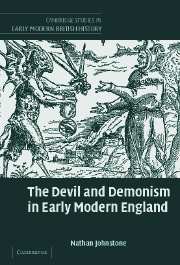Book contents
- Frontmatter
- Contents
- Acknowledgements
- 1 Introduction
- 2 The synagogue of Satan: anti-Catholicism, false doctrine and the construction of contrariety
- 3 Temptation: the Protestant dynamic of diabolic agency and the resurgence of clerical mediation
- 4 Satan and the godly in early modern England
- 5 Incarnate devils: crime narratives, demonisation and audience empathy
- 6 ‘What concord hath Christ with Belial?’: de facto satanism and the temptation of the body politic, 1570–1640
- 7 ‘Grand Pluto's Progress through Great Britaine’: the Civil War and the zenith of satanic politics
- 8 ‘The Devil's Alpha and Omega’: temptation at the cutting edge of faith in the Civil War and the Interregnum
- Conclusion
- Bibliography
- Index
- Cambridge Studies in Early Modern British History
1 - Introduction
Published online by Cambridge University Press: 23 June 2009
- Frontmatter
- Contents
- Acknowledgements
- 1 Introduction
- 2 The synagogue of Satan: anti-Catholicism, false doctrine and the construction of contrariety
- 3 Temptation: the Protestant dynamic of diabolic agency and the resurgence of clerical mediation
- 4 Satan and the godly in early modern England
- 5 Incarnate devils: crime narratives, demonisation and audience empathy
- 6 ‘What concord hath Christ with Belial?’: de facto satanism and the temptation of the body politic, 1570–1640
- 7 ‘Grand Pluto's Progress through Great Britaine’: the Civil War and the zenith of satanic politics
- 8 ‘The Devil's Alpha and Omega’: temptation at the cutting edge of faith in the Civil War and the Interregnum
- Conclusion
- Bibliography
- Index
- Cambridge Studies in Early Modern British History
Summary
THE ENGLISH REFORMATION AND THE PROTESTANT DEVIL
Baudelaire's famous comment – that the Devil's best trick was to convince mankind that he did not exist – was written in the hindsight of the scientific revolution and the Enlightenment that were believed to have rendered Satan a rather unworthy hangover from a more primitive age. Yet for all its contemporary novelty and wit, it gave expression to a far older concern over Satan's effective agency. Take away the connotations of his non-existence (made possible by the late seventeenth-century fashion for scepticism) and the same concern can be found underlining much of the religious and moral polemic produced during the English Reformation and its aftermath. Sixteenth- and seventeenth-century Protestants in particular were afraid, not that the Devil might convince man that he did not exist, but that he would persuade them that he was absent from their everyday lives.
In England the concept of the Devil underwent a very subtle process of cultural change in the hands of the Protestant reforming clergy. They were convinced that Satan offered an intimate threat to every Christian, especially when his agency was hidden from perception by the physical senses. This conviction was driven equally by a sense of personal danger in the face of demonic power, and by a belief that diabolism lay concealed behind the superficial piety of the Catholic church.
- Type
- Chapter
- Information
- The Devil and Demonism in Early Modern England , pp. 1 - 26Publisher: Cambridge University PressPrint publication year: 2006



